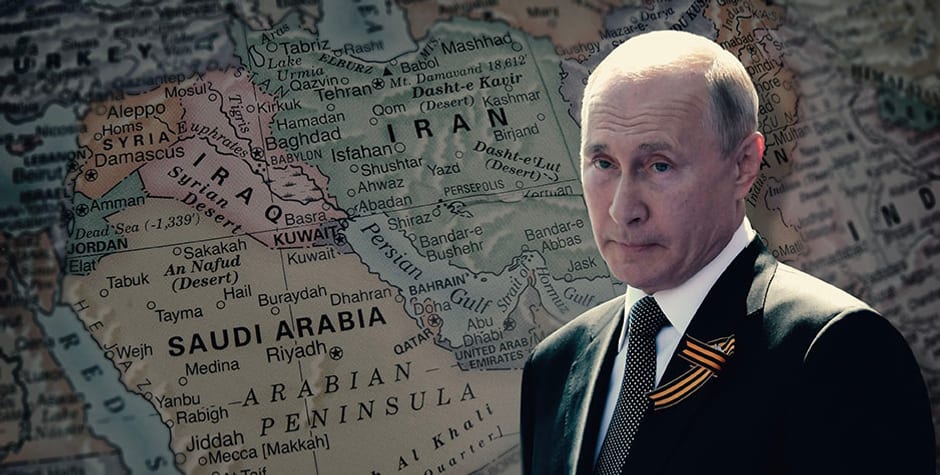The “Unholy Alliance” Reemerges and Expands as Russia Reasserts Its Influence in the Middle East
I have been consistent in my belief that while Russia is a problem, China is a crisis. The Communist Chinese government has infiltrated American academia and universities, Hollywood, Big Tech, and much of corporate America. And while there is a great deal to consider about China’s rising leverage over us, let me take some time to focus on the problem of Russia.
The recent announcement that Russia was ending its coordinating office at NATO was a bold move. And a wakeup call for the Biden Administration to get more involved with our allies in the Middle East.
NATO spokesperson Oana Lungescu said last week, "We have strengthened our deterrence and defense in response to Russia’s aggressive actions, while at the same time we remain open to dialogue, including through the NATO-Russia Council."
Western powers should be piecing together Russia’s rising influence in the Middle East; and they should act to blunt it soon. Only America can lead the Europeans to confront Russia. But President Biden can’t do it; he is too weak. Our allies see that Russia is pretending to solve tensions in places like Syria, Iran, Afghanistan, and Lebanon – but they are actually making problems worse.
While we were all grateful to hear that Russia would work to protect Israel’s security vis-à-vis their role as the occupier of Syria, the backlash from Iran and Turkey over the Russian announcement gave Russia second thoughts.
Moscow has managed to strike a covert deal with Israel in Syria, where Israel refrains from conducting operations that weaken the Assad regime, in return for Russian (and American) consent to Israel’s annexation of the Golan Heights. There was until recently a ‘balance of silence’ in this regard: Russian silence vis-à-vis Israeli actions in Syria. Syrian silence vis-à-vis repeated Israeli military operations on its territory. Iranian silence vis-à-vis the Russian-Israeli deal. Israeli silence regarding Iranian and Hezbollah influence in Syria. And Iran and Hezbollah’s silence over Russia’s consent to the Israeli annexation of the Golan . . . .
As all of this is happening, our allies and others are wondering where is Joe Biden? His silence is the reason Russia is getting louder. They see an opportunity now that the Trump Administration is gone.
It seems that everyone in the region is coordinating with Russia and waiting for Moscow to make a move. Under the Biden Administration, Russia has replaced the United States as the leader in the Middle East. And this spells disaster for the upcoming negotiations between Western powers and the Iranian regime over Iran’s pursuit of nuclear weapons. Iran has made clear that they want $10 billion from the Biden Administration before it even sits down to discuss the issue. The Europeans want Biden to pay it; the Russians want Biden to pay it; and I fear Joe Biden is getting ready to acquiesce. Afterall, the goal for the Biden team is to have a deal – any deal – not one that ensures Iran won’t have a path to a nuclear weapon.
But Congress should demand no secret negotiations or pre-conditions from the Biden team. We need a clear statement from President Biden of his intentions. Either he is rejecting the Iranian regime’s demand, or he is paying Iran to sit at the table.
Russia meanwhile is pressuring the Biden Administration to also support Syrian President Bashar al-Assad quietly (or at least look the other way) in exchange for its support of the Iranian nuclear negotiations. Russia doesn’t have the same threat assessment from Iran as the U.S. does so it is happy to take help for its primary concern, Syria.
Under the Trump Administration, the Saudis led the Sunni Arabs to band together against Iran in support of the Trump Administration’s sanctions policy. But today, under the Biden Administration, our Sunni allies are nervous about America’s resolve. They are looking for new alliances which is destabilizing for the region and troublesome for the U.S. And once again, Russia is quick to jump in.
And then there is the investigation by Lebanon into the explosion at the Beirut Port. Hezbollah, Iran’s proxy, is working to ensure there is no transparency about who and what was transitioning in and out of the port. They know what it would reveal. Iran, meanwhile, wants to form new alliances before the investigation catches up to them.
President Biden should look closer at what U.S. intelligence knows about the details and what it reveals about the Iranian Regime’s secret nuclear program. Either Director of National Intelligence Avril Haines hasn’t briefed President Biden on the details or she hasn’t read all the information herself. It is very troubling to see the U.S. continue pursuing nuclear talks with Iran under these circumstances. Compartmentalizing Iran’s various activities is reckless and naïve.
Without U.S. leadership, however, the Russians will continue to dominate the Middle East and the realignment they seek will make America less safe. In his 2017 New York Times Best Seller, ACLJ Chief Counsel Jay Sekulow highlighted this “Unholy Alliance” between Russia, Iran, and various Islamic nations. Now this unholy alliance is expanding as Russia reasserts its influence in the region. Iran, Syria, Lebanon, Afghanistan, and Iraq are all looking to see what Moscow says, not what Washington says.
Support the work of the ACLJ, as we continue to bring you expert analysis on the issues that matter most.

